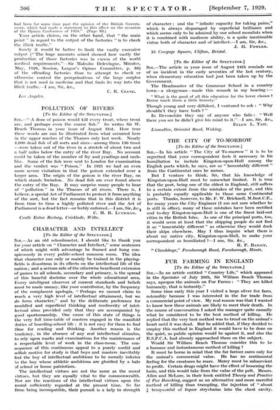CHARACTER AND INTELLECT
[To the Editor of the SPECTATOR.] SIR,--As an old schoolmaster, I should like to thank you for your article on " Character and Intellect," some sentences of which might with advantage be framed and hung con- spicuously in every public-school common room. The idea that character can only or mainly be trained in the playing- fields is disastrous in its effects on the intellectual life of the nation ; and a serious side of the otherwise beneficent extension of games to all schools, secondary and primary, is the spread of this baneful doctrine over the whole educational area. Every intelligent observer of current standards and beliefs must be made uneasy, like your contributor, by the frequency of the complacent apologia, " Perhaps we cannot claim to reach a very high level of intellectual attainment, but we do form character," and by the deliberate preference for muddled and superficial thinking and mediocrity of intel- lectual aims provided only that they are accompanied by good sportsmanship. One cause of this state of things is the very full time-table of masters engaged in the manifold duties of boarding-school life : it is not easy for them to find time for reading and thinking. Another reason is the tendency, in the absence of any real intellectual stimulus, to rely upon marks and examinations for the maintenance of a respectable level of work in the class-room. The con- sequence of this continuous appeal to a purely sordid and selfish motive for study is that boys and masters inevitably feel the boy of intellectual ambitions to be morally inferior to the boy whose athletic ambitions are glorified by a halo of school or house patriotism.
The intellectual virtues are not the same as the moral virtues, but they are equally vital to the commonwealth. Nor are the reactions of the intellectual virtues upon the moral sufficiently regarded at the present time. So far from being incompatible, their pursuit is a help to strength
of character ; and the " infinite capacity for taking pains," which is always disparaged by superficial brilliance and which seems only to be admired by our school moralists when it is combined with mediocre ability, is a quite inestimable virtue both of character and of intellect.—I am, Sir, &c., J. H. FOWLER. 16 Canynge Square, Clifton, Bristol.
































 Previous page
Previous page